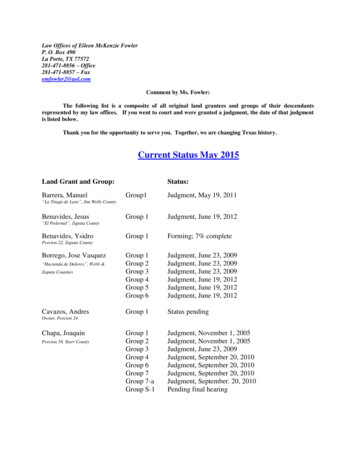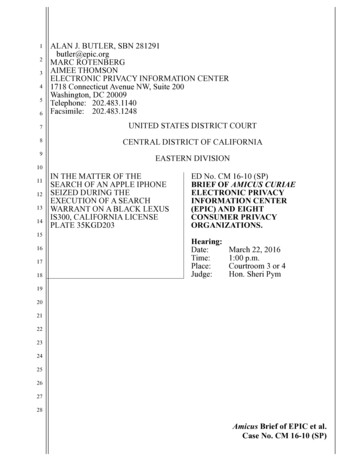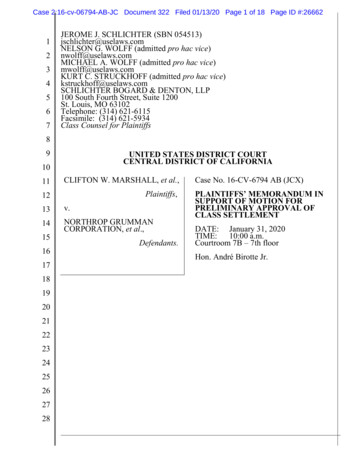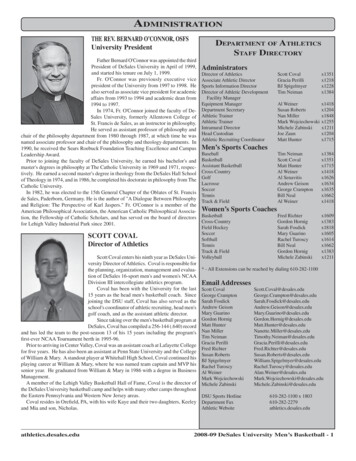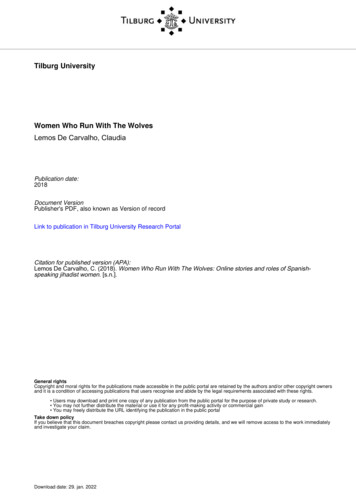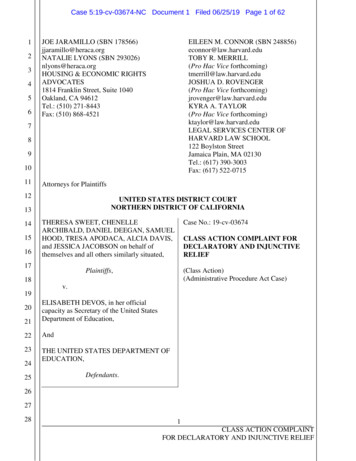
Transcription
Case 5:19-cv-03674-NC Document 1 Filed 06/25/19 Page 1 of 62123456JOE JARAMILLO (SBN 178566)jjaramillo@heraca.orgNATALIE LYONS (SBN 293026)nlyons@heraca.orgHOUSING & ECONOMIC RIGHTSADVOCATES1814 Franklin Street, Suite 1040Oakland, CA 94612Tel.: (510) 271-8443Fax: (510) 868-4521EILEEN M. CONNOR (SBN 248856)econnor@law.harvard.eduTOBY R. MERRILL(Pro Hac Vice forthcoming)tmerrill@law.harvard.eduJOSHUA D. ROVENGER(Pro Hac Vice forthcoming)jrovenger@law.harvard.eduKYRA A. TAYLOR(Pro Hac Vice forthcoming)ktaylor@law.harvard.eduLEGAL SERVICES CENTER OFHARVARD LAW SCHOOL122 Boylston StreetJamaica Plain, MA 02130Tel.: (617) 390-3003Fax: (617) 522-07157891011Attorneys for Plaintiffs12UNITED STATES DISTRICT COURTNORTHERN DISTRICT OF CALIFORNIA13141516THERESA SWEET, CHENELLEARCHIBALD, DANIEL DEEGAN, SAMUELHOOD, TRESA APODACA, ALCIA DAVIS,and JESSICA JACOBSON on behalf ofthemselves and all others similarly situated,17Case No.: 19-cv-03674CLASS ACTION COMPLAINT FORDECLARATORY AND INJUNCTIVERELIEFPlaintiffs,(Class Action)(Administrative Procedure Act Case)18v.1921ELISABETH DEVOS, in her officialcapacity as Secretary of the United StatesDepartment of Education,22And23THE UNITED STATES DEPARTMENT OFEDUCATION,202425Defendants.2627281CLASS ACTION COMPLAINTFOR DECLARATORY AND INJUNCTIVE RELIEF
Case 5:19-cv-03674-NC Document 1 Filed 06/25/19 Page 2 of 621PRELIMINARY STATEMENT2“For there is another kind of violence, slower but just as deadly, destructive as theshot or the bomb in the night. This is the violence of institutions; indifference andinaction and slow decay.”3Robert F. KennedyCleveland City ClubApril 5, 196845671. The Higher Education Act (HEA), Department of Education (Department) regulations, andstudents’ loan contracts allow students to cancel their federal student loans on the basis of their8school’s misconduct (borrower defense). More than 160,000 former for-profit college students9have done so and are awaiting a decision. But, the Department has not granted or denied a single10application since June 2018, and it has no timetable for doing so. The question in this case is11whether the Department’s refusal to decide borrower defenses is lawful. It is not.122. Over the past several decades, hundreds of thousands of students borrowed federal student1314loans to attend various for-profit colleges, including ITT Technical Institute (ITT), Corinthian15Colleges (Corinthian), DeVry University, the Art Institutes, Salter College, Brooks Institute of16Photography, and more. The schools promised high-paying jobs, state-of-the-art vocational17training, and long and fulfilling careers. These were lies. The schools actually delivered worthless18products that left students with thousands of dollars in debt, damaged credit, and depleted access19to further student aid.203. A number of these for-profit colleges have recently closed, including Corinthian, ITT,2122Brooks Institute of Photography, Vatterott College, Art Institutes, Argosy University, South23University, Charlotte School of Law, Arizona Summit Law School, Globe University & Minnesota24School of Business, FastTrain College, Marinello School of Beauty, Virginia College, and25Brightwood College.2627284. The Department was responsible for authorizing and overseeing the participation of each ofthese for-profit colleges in the federal student aid program.2CLASS ACTION COMPLAINTFOR DECLARATORY AND INJUNCTIVE RELIEF
Case 5:19-cv-03674-NC Document 1 Filed 06/25/19 Page 3 of 6215. Since 2015, former for-profit college students have increasingly asserted borrower defenses.2As the Department explained, “borrowers have a right to assert” such a claim, and so it started to3“set up a process to review and adjudicate them.” It developed a universal borrower defense form4and created a full-time borrower defense unit. In the six months before January 20, 2017, the567Department approved approximately 28,000 borrower defenses.6. But then the Department hit the brakes. Since January 20, 2017, the Department has claimed8to be taking a short “pause” to “re-evaluate” the prior administration’s actions; behind closed9doors, the Department’s “pause” has been a full stop. The Department has ignored the growing10pile of borrower defenses, reduced its capacity to decide borrower defenses, and diverted its11increasingly limited resources to un-do all of the prior administration’s work.127. In short, the Department has intentionally adopted a policy of inaction and obfuscation.13148. The Department’s abdication of its responsibility is not a neutral choice. Its decision to keep15over 160,000 students in limbo—some for over four years—has damaged students’ credit and16limited their access to federal student aid. It has caused significant emotional distress, associated17physical harm, and a loss of wealth and opportunity that students will never recover. For students18who have defaulted on their loans, the Department has invoked its extraordinary extrajudicial1920powers to garnish their wages or seize their tax credits (for many, their Earned Income Tax Credit).9. The Department’s failure to properly oversee the for-profit college industry on the front end,212223and its refusal to remediate the fraud that occurred on its watch, has eliminated any pretense thatthe government will protect these students.2410. Named Plaintiffs bring this lawsuit under the Administrative Procedure Act on behalf of25themselves and all other similarly situated individuals. They do not ask this Court to adjudicate262728their borrower defenses. Nor do they ask this Court to dictate how the Department should prioritizetheir pending borrower defenses. Their request is simple: they seek an order compelling the3CLASS ACTION COMPLAINTFOR DECLARATORY AND INJUNCTIVE RELIEF
Case 5:19-cv-03674-NC Document 1 Filed 06/25/19 Page 4 of 621Department to start granting or denying their borrower defenses and vacating the Department’s2policy of withholding resolution.3JURISDICTION AND VENUE456711. This action arises under the Administrative Procedure Act (APA), 5 U.S.C. §§ 701-706,and the HEA and its amendments, 20 U.S.C. § 1001, et seq. This Court has jurisdiction over thiscase as it arises under federal law. 28 U.S.C. § 1331.812. This Court is authorized to grant the relief requested in this case pursuant to the APA, 59U.S.C. § 706, the Declaratory Judgment Act, 28 U.S.C. §§ 2201-2202, the HEA, 20 U.S.C. § 1082,10and Federal Rule of Civil Procedure 23.1113. Venue is proper in this judicial district because Named Plaintiff Sweet resides in this1213district and no real property is involved in the action. 28 U.S.C. § 1391(e)(1).14INTRADISTRICT ASSIGNMENT1514. Assignment to the San Jose Division is appropriate pursuant to Local Rule 3-2 because16Named Plaintiff Sweet resides in Santa Clara County, California, and no exclusion to the rule17applies.18PARTIES192015. Plaintiff Theresa Sweet is a resident of Los Gatos, located in Santa Clara County,21California. Ms. Sweet attended Brooks Institute of Photography and asserted her borrower defense22in Fall 2016.232416. Plaintiff Tresa Apodaca is a resident of Coeur d’Alene, located in Kootenai County, Idaho.Ms. Apodaca attended Heald College and asserted her borrower defense in May 2015.252627284CLASS ACTION COMPLAINTFOR DECLARATORY AND INJUNCTIVE RELIEF
Case 5:19-cv-03674-NC Document 1 Filed 06/25/19 Page 5 of 62117. Plaintiff Chenelle Archibald is a resident of Worcester, located in Worcester County,2Massachusetts. Ms. Archibald attended Salter College and asserted her borrower defense in34February 2016.18. Plaintiff Daniel Deegan is a resident of Mt. Laurel, located in Burlington County, New567Jersey. Mr. Deegan attended DeVry University and asserted his borrower defense in November2016.819. Plaintiff Samuel Hood is a resident of Orlando, located in Orange County, Florida. Mr.9Hood attended ITT and asserted his borrower defense in January 2018 and again in February 2019.1020. Plaintiff Alicia Davis is a resident of Orlando, located in Orange County, Florida. Ms.11Davis attended Florida Metropolitan University and asserted her borrower defense in April 201512and again in June 2016.131421. Plaintiff Jessica Jacobson is a resident of Lunenburg, located in Worcester County,15Massachusetts. Ms. Jacobson attended the New England Institute of Art and asserted her borrower16defense in March 2015.1722. Defendant Elisabeth DeVos is the Secretary of Education (the Secretary) and charged by18statute with the supervision and management of all decisions and actions of the United States1920Department of Education. Plaintiffs sue Secretary DeVos in her official capacity.23. Defendant United States Department of Education is an “agency” of the United States,212223within the meaning of the APA, 5 U.S.C. § 701(b)(1). It is responsible for overseeing andimplementing rules for the federal student aid program.24ALLEGATIONS COMMON TO THE CLASS25Administrative Procedure Act26272824. The APA requires a federal agency to render responsive decisions on matters within itspurview in a prompt and definite fashion.5CLASS ACTION COMPLAINTFOR DECLARATORY AND INJUNCTIVE RELIEF
Case 5:19-cv-03674-NC Document 1 Filed 06/25/19 Page 6 of 62125. For example, the APA requires that, “[w]ith due regard for the convenience and necessity2of the parties or their representatives and within a reasonable time, each agency shall proceed to3conclude a matter presented to it.” 5 U.S.C. § 555(b).426. The APA similarly requires that “prompt notice shall be given of the denial in whole or in56789101112part of a written application, petition, or other request of an interested person made in connectionwith any agency proceeding.” 5 U.S.C. § 555(e).27. And, the APA requires that “[e]ach agency . . . [g]ive an interested person the right topetition for the issuance, amendment, or repeal of a rule.” 5 U.S.C. § 553(e).28. “A person suffering legal wrong because of agency action, or adversely affected oraggrieved by agency action within the meaning of a relevant statute, is entitled to judicial reviewthereof.” 5 U.S.C. § 702. “Agency action” includes the “failure to act.” 5 U.S.C. § 553(e).13141529. A Court “shall – compel agency action unlawfully withheld or unreasonably delayed.” 5U.S.C. § 706(1).1630. A Court shall also “hold unlawful and set aside agency action, findings, and conclusions17found to be . . . arbitrary, capricious, an abuse of discretion, or otherwise not in accordance with18law.” 5 U.S.C. § 706(2)(A).1920The Secretary’s Authority over FFEL and Direct Loan Programs31. Title IV of the HEA, 20 U.S.C. §§ 1070-1099, provides the statutory authorization for21federal student loans, including the Federal Family Education Loan (FFEL) and Direct Loan2223programs.2432. The Secretary oversees and is responsible for these programs. See 20 U.S.C. § 1070.2533. Under the FFEL program, private lenders issued student loans, which were then insured by26guaranty agencies and in turn reinsured by the Department. Id. § 1078(b)-(c).27286CLASS ACTION COMPLAINTFOR DECLARATORY AND INJUNCTIVE RELIEF
Case 5:19-cv-03674-NC Document 1 Filed 06/25/19 Page 7 of 62134. A guaranty agency is “[a] state or private nonprofit organization that has an agreement with2the Secretary under which it will administer a loan guarantee program under the Act.” 34 C.F.R.34§ 682.200.35. No new loans can be made under the FFEL program, effective July 1, 2010.56789101136. Under the Direct Loan program, the federal government directly issues student loans toeligible student borrowers for use at “participating institutions of higher education” as approvedby the Department. See 20 U.S.C. § 1087a.37. Direct loans and FFEL loans have the same terms, conditions, and benefits, under the HEA.20 U.S.C. § 1087e(a)(1).38. All institutions approved by the Department to participate in Title IV programs must enter12into a Program Participation Agreement with the Department. See 20 U.S.C. § 1094; 34 C.F.R. §1314668.14(a).1539. By entering into a program participation agreement, a school agrees to, among other things,16“comply with all statutory provisions of or applicable to Title IV of the HEA, all applicable17regulatory provisions prescribed under the statutory authority,” and applicable state laws in its18administration of its program and in its dealings with students. See 34 C.F.R. § 668.14(b).1940. If a school fails to comply with its contractual obligations, the Secretary may take20corrective action. For instance, the Secretary may fine the school, suspend the program2122participation agreement, or terminate the school’s participation in Title IV.2341. These programs have been, and the Direct Loan program continues to be, an important24source of financing for individuals who otherwise would not be able to afford higher education25and could not meet underwriting standards of private lenders.26272842. Indeed, the purpose of the Direct Loan program is “to assist in making available thebenefits of postsecondary education to eligible students[.]” 20 U.S.C. § 1070(a).7CLASS ACTION COMPLAINTFOR DECLARATORY AND INJUNCTIVE RELIEF
Case 5:19-cv-03674-NC Document 1 Filed 06/25/19 Page 8 of 62123443. The Department has significant collection powers when a FFEL or Direct Loan borrowerdefaults on her student loans.44. Most notably, the Department can extra-judicially seize federal tax refunds and garnishfederal student loan borrowers’ wages and benefits. See 31 U.S.C. § 3716; 31 U.S.C. § 3720A; 31567U.S.C. § 3720D.45. When the Department invokes one of these powers, it must provide the student borrower8with notice and the opportunity to request a hearing to contest the debt. See 20 U.S.C. §91095a(a)(5); 34 C.F.R. §§ 30.22(d); see also U.S. Const. Amend. V.101146. The Department requires any such objection to the enforceability of the debt to beadjudicated quickly.1247. For example, the Department requires that a timely objection to the validity of a debt raised131415in response to a notice of proposed wage garnishment be decided “not later than 60 days after thedate on which [the Department] received the request for hearing.” 34 C.F.R. § 34.16(a).1648. The Department similarly requires that guaranty agencies adjudicate discharge applications17in short order. See 34 C.F.R. § 682.402(d)(6)(ii)(G) (guaranty agency must review and provide a18decision for closed school applications within 90 days); 34 C.F.R. § 682.402(e)(6)(iv) (guaranty19agency must review and provide a decision for false certification applications within 90 days); 3420C.F.R. § 682.402(h)(1)(i)(A) (guaranty agency must review death, disability, and bankruptcy claim2122and make payment within 45 days after a claim is filed by the lender); 34 C.F.R. § 682.402(n)(1)23(guaranty agency must review unpaid refund claim no later than 45 days after a properly filed24request).252649. Finally, the Department must follow certain requirements before reporting the borrowers’debt to a consumer reporting agency.27288CLASS ACTION COMPLAINTFOR DECLARATORY AND INJUNCTIVE RELIEF
Case 5:19-cv-03674-NC Document 1 Filed 06/25/19 Page 9 of 62150. For Direct Loan borrowers, the Master Promissory Note provides that the Department “will2report information about [the student’s] loan to nationwide consumer reporting agencies34(commonly known as credit bureaus) on a regular basis.” It further informs that if a borrowerdefaults on the loan, she “will be given a chance to ask for review of the debt before [the56789101112Department] report[s] it.”51. Under the Fair Credit Reporting Act, if a borrower disputes her debt, a furnisher has 30days to complete an investigation into the validity of the claim. See 15 U.S.C. § 1681s-2(E)(iii).Borrower Defense52. Borrowers of FFEL and Direct Loans can assert a right to a complete discharge of theirfederal student loans on the basis of their school’s misconduct—i.e., a borrower defense.53. Borrower defense arises in the backdrop of the Federal Trade Commission’s Trade1314Regulation Rule Concerning Preservation of Consumer’s Claims and Defenses (Holder Rule), 1615C.F.R. Pt. 433, which was promulgated in 1975. 40 Fed. Reg. 53506 (Nov. 18, 1975). The Holder16Rule ensures that consumers are not forced to repay loans to a financer when a seller fails to17provide the goods or services purchased.18192054. The logic underlying the Holder Rule is that, as between “an innocent consumer, whosedealings with an unreliable seller are, at most, episodic, and a finance institution . . . the financeris in a better position both to protect itself and to assume the risk of a seller’s reliability.” Id. at21222353509. By making financers liable for a seller’s misconduct, the Holder Rule encourages lendersto avoid commercial dealings with disreputable sellers that defraud consumers.2455. Drawing upon the Holder Rule, a holder of a FFEL loan is, by regulation, “subject to all25claims and defenses that the borrower could assert against the school with respect to that loan” if26a sufficiently close relationship existed between the school and the lender. 34 C.F.R. § 682.209(g).27289CLASS ACTION COMPLAINTFOR DECLARATORY AND INJUNCTIVE RELIEF
Case 5:19-cv-03674-NC Document 1 Filed 06/25/19 Page 10 of 62156. Since approximately 1994, every FFEL loan has been governed by a Master Promissory2Note (“MPN”) that contains similar language, providing that the borrower is entitled to assert, as3a defense to repayment of the loan, “all claims and defenses that the borrower could assert against4the school.”567857. Similarly, in 1993, Congress altered the terms and conditions of Direct Loans to allow forstudent loan borrowers to seek cancellation of their loans on the basis of school misconduct. 103P.L. 66, 107 Stat. 312.958. The statute directs that “the Secretary shall specify in regulations which acts or omissions10of an institution of higher education a borrower may assert as a defense to repayment of a loan11made under this part[.]” 20 U.S.C. § 1087e(h).1259. Implicit in this statutory directive is that the Department must recognize at least some acts1314or omissions as establishing a borrower defense.1560. Pursuant to this directive, the Secretary promulgated a regulation that permits a Direct Loan16borrower to assert, as a defense to repayment, “any act or omission of the school attended by the17student that would give rise to a cause of action against the school under applicable state law.” 3418C.F.R. § 685.206(c)(1).1961. This regulation became effective July 1, 1995, and governs the claims of all Direct Loans20issued from that time until at least July 1, 2017. Id. at § 685.222.212262. Starting in 1995 and at least until October 16, 2018, all Direct Loans have been issued23pursuant to a MPN that informs borrowers that he or she “may assert, as a defense against24collection of [his or her] loan, that the school did something wrong or failed to do something that25it should have done,” provided that “the school’s act or omissions directly relates to [his or her]26loan or to the educational services that the loan was intended to pay for, and if what the school did272810CLASS ACTION COMPLAINTFOR DECLARATORY AND INJUNCTIVE RELIEF
Case 5:19-cv-03674-NC Document 1 Filed 06/25/19 Page 11 of 621or did not do would give rise to a legal cause of action against the school under applicable state2law.”3463. Upon a successful borrower defense assertion, the Secretary “may initiate a proceeding tocollect from the school the amount of relief resulting from a borrower defense.” Id. at567§685.222(a)(6)64. The Higher Education Act, the Department’s regulations, and students’ MPN requires the8Department to adjudicate borrower defense assertions, and to grant at least some borrower9defenses.101165. When a borrower establishes a borrower defense, the Department has a mandatory duty tonotify the borrower and to provide her with some relief. Calvillo Manriquez v. DeVos, 345 F. Supp.123d 1077, 1100 (N.D. Cal. 2018).131466. Before it can certify a defaulted borr
5. Since 2015, former for-profit college students have increasingly asserted borrower defenses. As the Department explained, “borrowers have a right to assert” such a claim, and so it started to “set up a process to review and adjudicate them.” It developed a universal borrower defense form and created a full-time borrower defense unit.
